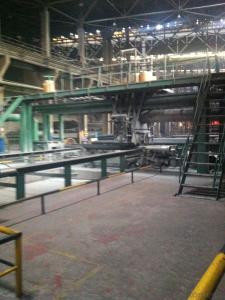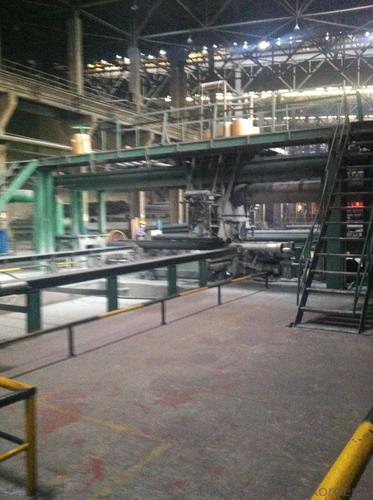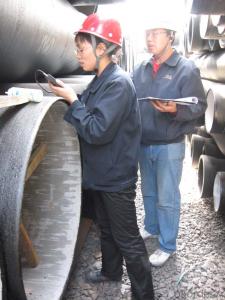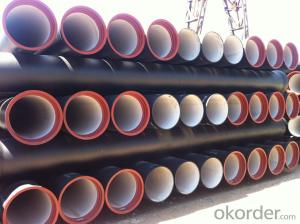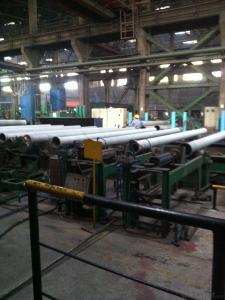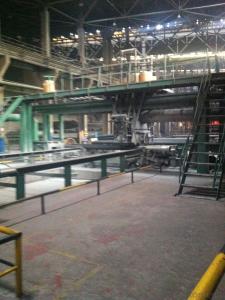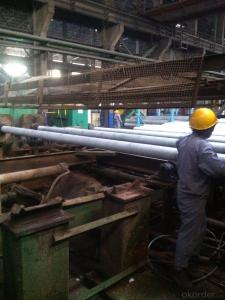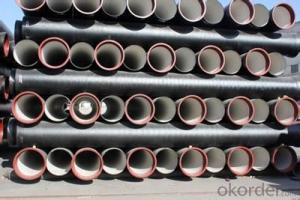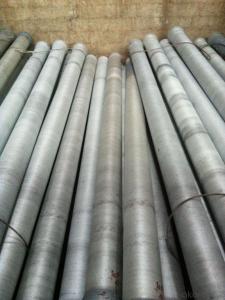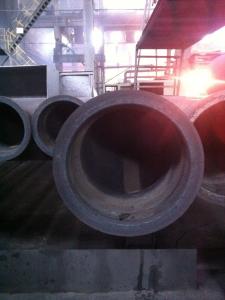DUCTILE IRON PIPE AND PIPE FITTINGS K9 CLASS DN800
- Loading Port:
- Tianjin
- Payment Terms:
- TT OR LC
- Min Order Qty:
- 21 pc
- Supply Capability:
- 3000 pc/month
OKorder Service Pledge
OKorder Financial Service
You Might Also Like
Material : Ductile Cast Iron
Size Range : DN 80mm to DN 2000mm
Unit Effective Length : 6m or 5.7m
Manufacture Standard: ISO 2531:1998/ EN 545:2006/EN 598:2007
Annual capacity : 200,000 tons
Coating Exterior: Zinc 130g/m2 according to ISO 8179-1 and bitumen coating 70 microns.
Cement Interior: Portland Cement/ High Alumina Cement/ Sulphate Resisting Cement Lining according to ISO 4179
Special requirements on external coating and internal lining can be applied
We also provide accessories such as SBR/EPDM rubber gaskets, lubricant paste, pipe caps, PE sleeves, etc.
Additional Parts:
Each pipe is strictly inspected according to related standard to ensure permanently high performance.
Easy Installation at site and service free for life
Long Service Lifespan
Quotation will arrive you within 24hours once we get your inquiry.
We guarantee offering you a competitive price.
A copy of original inspection reports of pipes will be offered after shipment.
Photos of loading process will be sent to the customer after shipment effect.
We will follow-up the delivery progress after shipment effect and update to the customer on weekly basis.
- Q: What is the internal lining used in ductile iron pipes?
- The internal lining used in ductile iron pipes is typically a cement mortar lining.
- Q: How much is the installation of cast iron pipe drainage 1 meters?
- Water supply pipe is the first choice, with high cost performance. Compared with the PE pipe, from the installation time, ductile pipe PE pipe installation is simple and rapid, and after the installation of internal and external bearing pressure better;
- Q: How do ductile iron pipes perform in high-altitude areas?
- Ductile iron pipes perform well in high-altitude areas as they are highly resistant to corrosion and can withstand extreme temperature variations. The material's flexibility and strength make it suitable for handling increased pressure caused by altitude changes, ensuring reliable water distribution systems even in mountainous regions.
- Q: Nodular cast iron, heat treatment process and so on
- The chill is estimated to be too low in carbon equivalent, poorly bred or cooled too quickly!
- Q: Are ductile iron pipes more resistant to breaks and cracks than other pipe materials?
- Yes, ductile iron pipes are generally more resistant to breaks and cracks compared to other pipe materials. Ductile iron is a type of cast iron that has been treated with magnesium to make it more flexible and less brittle. This enhanced flexibility allows ductile iron pipes to withstand high levels of pressure and external loads without breaking or cracking. Compared to other common pipe materials like PVC, HDPE, or steel, ductile iron pipes have superior strength and durability. They have a higher tensile strength, which means they can withstand greater forces and pressures without failing. Additionally, ductile iron pipes have a higher impact resistance, making them less prone to cracking or breaking under sudden impact or external loads. Another advantage of ductile iron pipes is their resistance to corrosion. The material is naturally resistant to rust and can withstand harsh environmental conditions, making it suitable for underground installations or areas with corrosive soils. This corrosion resistance further contributes to the longevity and overall integrity of the pipes. Furthermore, ductile iron pipes have a longer lifespan compared to other pipe materials. They are designed to last for several decades, often exceeding 50 years, with minimal maintenance. This extended lifespan reduces the need for frequent replacements, saving both time and money in the long run. However, it is important to note that no material is completely immune to damage or failure. Proper installation, maintenance, and adherence to industry standards and guidelines are essential to ensure the optimal performance and longevity of ductile iron pipes. Regular inspection and monitoring should also be conducted to identify any potential issues or signs of deterioration, allowing for timely repairs or replacements.
- Q: What are the typical bedding and backfill requirements for ductile iron pipes?
- To ensure the correct installation and long-term effectiveness of ductile iron pipes, it is important to adhere to the typical requirements for bedding and backfill. The bedding material should be a granular substance that provides support and evenly distributes the load on the pipe. Suitable materials include sand, gravel, or crushed stone. The bedding material should be placed uniformly and continuously along the bottom of the trench, with a minimum thickness of 6 inches. The width of the bedding layer should be at least 1.5 times the outer diameter of the pipe, or as specified by the pipe manufacturer. Once the bedding is in place, the remaining space around the pipe should be filled with backfill material. This material should also be granular and free from large stones, debris, or organic matter. It should be compacted in 6-inch increments using appropriate compaction equipment. The backfill should be evenly distributed around the pipe, ensuring there are no gaps or voids. Excessive compaction should be avoided to prevent damage or deformation of the pipe. The backfill material should extend at least 12 inches above the top of the pipe. In addition to following the bedding and backfill requirements, it is crucial to adhere to any specific guidelines provided by the pipe manufacturer. These guidelines may include recommendations for specific materials, compaction methods, or additional protective measures. Overall, proper bedding and backfilling of ductile iron pipes are essential for maintaining the structural integrity and preventing damage or failure. By following industry standards and manufacturer specifications, the pipes will perform effectively and last for a long time in various applications.
- Q: Can ductile iron pipe be used for road and highway crossings?
- Ductile iron pipe is indeed suitable for road and highway crossings. This material, known for its strength and durability, is ideal for underground infrastructure projects like road and highway crossings. Its remarkable ability to withstand heavy loads, corrosion, and external forces makes it the perfect choice for enduring the traffic and environmental conditions commonly encountered in road and highway crossings. Moreover, ductile iron pipe comes in different sizes and strengths, offering customization options to meet the specific needs of the crossing. To maximize the longevity and performance of ductile iron pipes in road and highway crossings, it is crucial to follow proper installation techniques and adhere to relevant industry standards.
- Q: How do ductile iron pipes handle differential settlement?
- Ductile iron pipes are known for their exceptional durability and ability to withstand various environmental conditions, including differential settlement. Differential settlement refers to the uneven settling of the ground, which can often lead to stress and strain on underground pipes. Ductile iron pipes are specifically designed to handle such settlement issues due to their inherent flexibility and strength. These pipes have the ability to flex and accommodate slight ground movements without causing significant damage or failure. The flexibility of ductile iron pipes allows them to distribute the stress and strain caused by differential settlement more uniformly along their length. This feature helps prevent concentrated stress points that could potentially lead to cracks or fractures in the pipe. Additionally, the inherent strength of ductile iron pipes provides them with the necessary resistance to withstand the forces generated by differential settlement. The pipes' robust construction and high tensile strength make them less susceptible to deformation or damage caused by ground movements. Furthermore, ductile iron pipes are commonly installed with flexible joints, such as rubber gaskets or push-on joints. These joints allow for some movement and accommodate any slight misalignment or settlement that may occur. By providing flexibility at the joints, the pipes can better adapt to changes in ground conditions and reduce the risk of failure. In summary, ductile iron pipes are well-equipped to handle differential settlement due to their flexibility, strength, and the use of flexible joints. These features ensure that the pipes can withstand ground movements and continue to function effectively without compromising their integrity or longevity.
- Q: Can ductile iron pipes be used for underground water treatment systems?
- Indeed, underground water treatment systems can utilize ductile iron pipes. Renowned for their robustness and longevity, these pipes are well-suited for a range of uses, including underground water treatment systems. They possess exceptional resistance to corrosion, rendering them perfect for transporting water through even the harshest subterranean surroundings. Furthermore, ductile iron pipes boast a remarkable load-bearing capacity, enabling them to withstand the immense pressure and weight exerted by the soil above. Additionally, their versatility allows for simple installation and maintenance, making them a sensible option for underground water treatment systems.
- Q: Can ductile iron pipe be used for stormwater systems?
- Yes, ductile iron pipe can be used for stormwater systems. Ductile iron pipe is a strong and durable material that is commonly used for various applications, including stormwater systems. It has excellent corrosion resistance, making it suitable for handling stormwater, which often contains debris and chemicals. Ductile iron pipe also has high tensile strength and can withstand heavy loads and pressures, making it a reliable choice for stormwater systems that may experience significant flow rates and occasional surges. Additionally, ductile iron pipe is available in various sizes and configurations, allowing for flexibility and adaptability in designing stormwater systems.
Send your message to us
DUCTILE IRON PIPE AND PIPE FITTINGS K9 CLASS DN800
- Loading Port:
- Tianjin
- Payment Terms:
- TT OR LC
- Min Order Qty:
- 21 pc
- Supply Capability:
- 3000 pc/month
OKorder Service Pledge
OKorder Financial Service
Similar products
Hot products
Hot Searches
Related keywords
